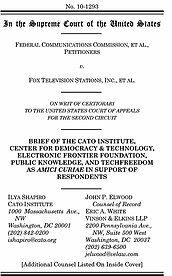Learn more about Cato’s Amicus Briefs Program.
Who controls the content of TV and radio broadcasts, parents or the FCC? In the 1978 case of FCC v. Pacifica Foundation, the Supreme Court held that, because over-the-air broadcast media is like an “unwanted intruder” in the home that is uniquely accessible to children, the FCC has a role in maintaining the cleanliness of the transmissions. Because of these unique characteristics, the regulation of broadcast media was held to a lesser constitutional standard than other types of media. That ruling was largely based on the technology of the time: three channels, little cable, and no VCRs, much less Internet, DVDs, and satellite TV. Since that time, the FCC has regulated broadcasts under that lower constitutional standard, including fining stations for so-called “fleeting expletives” uttered by celebrities on live awards shows, the infraction from which this case springs (it was Bono, then Cher, then Paris Hilton and Nicole Richie). This case is visiting the Supreme Court for the second time. In 2009, the Court ruled that an FCC rule against “fleeting expletives” was not an unlawful under administrative law, the law governing executive agencies’ power. On remand, the Second Circuit struck down the rule on First Amendment grounds, largely on the reasoning that Pacifica had been obviated by technological change. Cato has joined forces on an amicus brief with a wide range of groups advocating freedom in technology policy — the Electronic Frontier Foundation, the Center for Democracy & Technology, Public Knowledge, and TechFreedom — to underscore for the Court just how different the world is today from 1978. While the groups joining the brief do not necessarily agree with each other all the time, we agree on this fundamental truth: broadcast media (the most prominent way we become informed) should not receive watered-down First Amendment protection. We point out how the existence of Video-On-Demand services like Netflix, DVRs, Internet sites like Hulu, as well as massive access to DVDs, has radically transformed how we consume media. Broadcast media is no longer an “unwanted intruder,” but more like an invited guest. Moreover, with the existence of parental control mechanisms like the V‑Chip, parental locks included in cable and satellite boxes, and even services like “TV Guardian” — which filters live TV based on the closed-captioning signal — parents have all the tools at their disposal to ensure that children aren’t exposed to fleeting expletives or anything else unwanted. So why does the FCC need a vague and overbroad rule that could not pass heightened scrutiny and can only survive under a watered-down First Amendment standard? We live in a world that few could have imagined in 1978. It’s time for a new rule that gives broadcast media the same level of speech protection as any other kind.

This work is licensed under a Creative Commons Attribution-NonCommercial-ShareAlike 4.0 International License.


